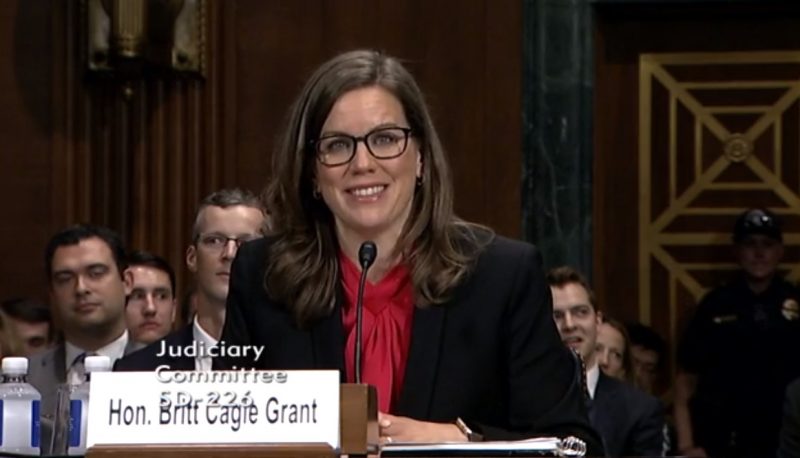“Confirmed Judges, Confirmed Fears” is a blog series documenting the harmful impact of President Trump’s judges on Americans’ rights and liberties. Cases in the series can be found by issue and by judge at this link.
Trump judge Britt Grant was the deciding vote in a divided Eleventh Circuit panel decision rejecting a convicted man’s claim of ineffective assistance of counsel when his own lawyer conceded to the jury that he had actually committed one of the robberies he was on trial for. The case was Thompson v. United States.
Stanley Thompson and another man were on trial in federal court for a series of armed robberies of six banks and a Taco Bell restaurant in violation of a law called the Hobbs Act. After the prosecution rested, Thompson’s lawyer conceded to the jury that he had, in fact, committed the Taco Bell robbery, likely as a strategy to dissociate himself from the bank robberies. The attorney was apparently acting on the mistaken belief that the government had failed to produce evidence that the robbery had affected interstate commerce, an element of the crime under the Hobbs Act. Had this been the case, then admitting to the Taco Bell robbery would not have been the same as admitting to the crime Thompson was on trial for.
But in fact, all the prosecutor had to do was show that the robbery reduced the assets of a company involved in interstate commerce, which would clearly be the case for a nationwide chain like Taco Bell.
Nevertheless, according to the majority, the defense lawyer’s concession did not rise to the level of admitting guilt, because he still denied an essential element of the crime: that it affected interstate commerce. Moreover, according to the panel, Thompson failed to meet his burden of showing that the result would have been different but for the lawyer’s mistake, because there was significant additional evidence linking him to the series of robberies.
Judge Adalberto Jordan dissented. The panel had originally considered and rejected Thompson’s argument in 2019. But in response to Thompson’s petition for rehearing, Judge Jordan wrote that “we made a mistake” in the original panel ruling. He cited the 2018 Supreme Court case McCoy v. Louisiana, which also involved a criminal defense attorney who conceded some but not all elements of a crime, in that case over the client’s clear objection.
Writing for the Court, Justice Ginsburg explained that when a client’s autonomy rather than counsel’s competence is at issue, the Court’s precedents on ineffective assistance on counsel do not apply. The defendant in that case did not need to prove that their lawyer’s error made a difference in how the case turned out. Instead, having a lawyer concede key elements of a crime over their client’s objections is a “structural” problem that goes to the core of the justice system and requires a new trial.
Judge Jordan would have applied that principle to this case and remanded the case for an evidentiary hearing to determine whether Thompson’s lawyer had acted over his objection.

